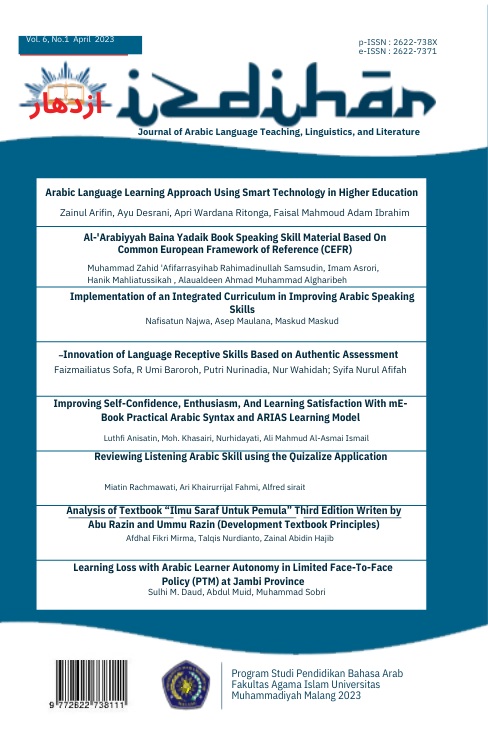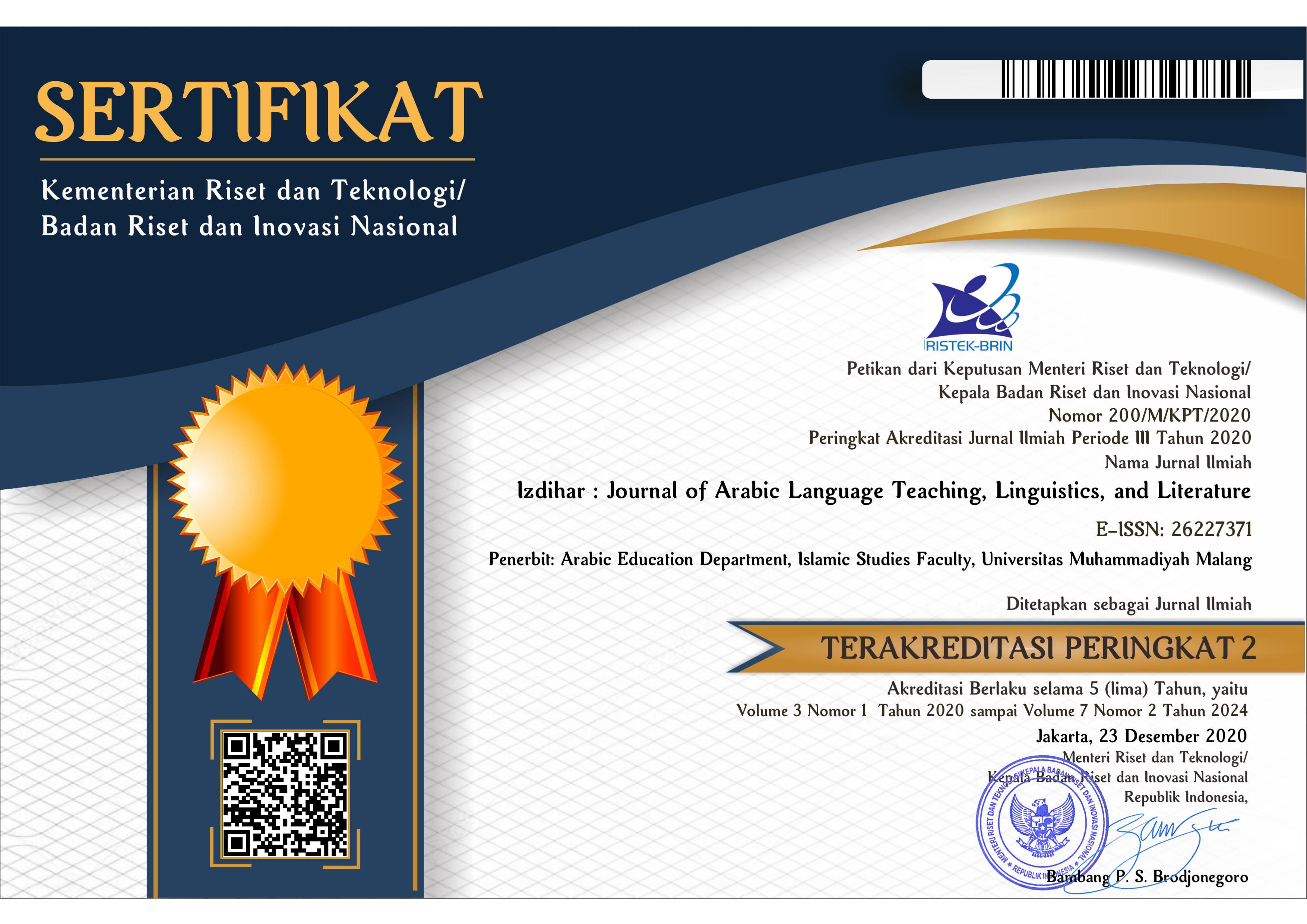Improving Self-Confidence, Enthusiasm, And Learning Satisfaction With mE-Book Practical Arabic Syntax and ARIAS Learning Model
DOI:
https://doi.org/10.22219/jiz.v6i1.24178Keywords:
ARIAS, mE-Book, Practical Arabic SyntaxAbstract
This study aimed to determine the level of effectiveness of mE-Book practical Arabic syntax with the ARIAS learning model in increasing self-confidence, enthusiasm for learning, learning satisfaction, and student learning outcomes. The research method used is a quantitative approach with a one group pretest-posttest design model with data collection techniques in the form of observations, questionnaires, tests, and documentation. Data analysis techniques are obtained from the distribution of normality, hypothesis testing and n-gain. This research was conducted at ma'had Nurul Furqon Malang in grade X of high school with a total of 20 students. The results of the study prove that the use of mE-Book practical Arabic syntax with the ARIAS learning model can effectively increase self-confidence, student enthusiasm, learning satisfaction, and student learning outcomes.
Downloads
References
Aminah, I. S., Muchyidin, A., Akbar, R. O., Siti, I., Raudhatul, A., & Yaqien, A. H. (2022). ARIAS Learning Model (Assurance, Relevance, Interest, Assessment, Satisfaction) And Their Effect on Madrasah Tsanawiyah Student Creativity. Journal of General Education and Humanities, 1(1), 39–46. https://doi.org/10.58421/GEHU.V1I1.4
Anisatin, L., Sunarto, S., & Fauzi, M. F. (2021). Development of mE-Book Based Practical Arabic syntax. LISANIA: Journal of Arabic Education and Literature, 5(2), 187–203. https://doi.org/10.18326/LISANIA.V5I2.187-203
Arifin, M., Sari, A. P., Maulana Tama, A., Keguruan, D. F., Pendidikan, I., Muhammadiyah, U., Utara, S., Fakultas, M., & Dan, K. (2017). Implikasi Teori Belajar Sibernetik Dalam Proses Pembelajaran Dan Penerapan It Di Era Modern. Seminar Nasional Kedua Pendidikan Berkemajuan Dan Menggembirakan(The Second Progressive and Fun Education Seminar), 247.
Chang, Y.-S., Xie, H., & Lin, X.-F. (2021). Applying the ARCS Motivation Theory for the Assessment of AR Digital Media Design Learning Effectiveness. Sustainability 2021, Vol. 13, Page 12296, 13(21), 12296. https://doi.org/10.3390/SU132112296
Danuri. (2019). Perkembangan Dan Transformasi Teknologi Digital. Infokam: Informasi Komputer, Akuntansi, Dan Manajemen, 15(2). https://doi.org/10.53845/infokam.v15i2.178
Emmert, & Dehmer. (2019). Understanding Statistical Hypothesis Testing: The Logic of Statistical Inference. Machine Learning and Knowledge Extraction, 1(3), 945–961. https://doi.org/10.3390/make1030054
Erbil, D. G. (2020). A Review of Flipped Classroom and Cooperative Learning Method Within the Context of Vygotsky Theory. Frontiers in Psychology, 11(June), 1–9. https://doi.org/10.3389/fpsyg.2020.01157
Fakhruddin. (2019). Technology-Based Teaching Material Development Training for Pre-Service Teachers to Improve Students’ Learning Outcomes. NOBEL: Journal of Literature and Language Teaching, 10(1). https://doi.org/10.15642/NOBEL.2019.10.1.87-102
Fitria. (2019). Pengembangan E-Book Berbasis Multimedia Pada Pembelajaran Ipa Kelas Viii Sesuai Dengan Gaya Belajar Peserta Didik Untuk Meningkatkan Aktivitas Dan Hasil Belajar. E-Tech : Jurnal Ilmiah Teknologi Pendidikan, 7(2). https://doi.org/10.24036/et.v7i2.107190
Furaida, L. (2021). Implementation of cybernetic learning theory on scientific philosophy learning. Epistema, 2(1), 23–32. https://doi.org/10.21831/ep.v2i1.40383
Hardani. (2019). Pengembangan Model Pembelajaran Arias Berbantuan Media Film Dokumenter Dalam Pembelajaran Menulis Teks Eksposisi [Universitas Pendidikan Indonesia]. In P. http://repository.upi.edu/36627/
Hayat, F. (2021). The Effect Of Education Using Video Animation On Elementary School In Hand Washing Skill. Acitya: Journal of Teaching and Education, 3(1). https://doi.org/10.30650/ajte.v3i1.2135
Khatun, N. (2021). Applications of Normality Test in Statistical Analysis. Open Journal of Statistics, 11(01), 113–122. https://doi.org/10.4236/OJS.2021.111006
Kusuma, J. W. (2019). Pengaruh Model Pembelajaran ARIAS dan Cooperative Script terhadap Minat dan Hasil Belajar Matematika. ANARGYA: Jurnal Ilmiah Pendidikan Matematika, 2(1). https://doi.org/10.24176/anargya.v2i1.3460
Lestari. (2018). Peran Teknologi dalam Pendidikan di Era Globalisasi. EDURELIGIA: Jurnal Pendidikan Agama Islam, 2(2). https://doi.org/10.33650/edureligia.v2i2.459
Liao, Y. H., Tang, K. S., Chen, C. J., Huang, Y. H., & Tiao, M. M. (2021). A study on how using an interactive multimedia e-book improves teachers’ ability to teach evidence-based medicine depending on their seniority. BMC Medical Education, 21(1), 1–9. https://doi.org/10.1186/s12909-021-02984-2
Margawati, S. (2021). Model Pembelajaran ARIAS (Assurance, Relevance, Interest, Assesment, Satisfaction) Melalui Media Kartu Bergambar dalam Meningkatkan Keterampilan Menulis Pantun. Jurnal Pendidikan Indonesia, 2(2), 304–315. https://doi.org/10.36418/japendi.v2i2.92
Molla. (2019). The Effectiveness Of Arias Learning Model Assisted Audiovisual Media Improving Learning Outcomes. Indonesian Journal of Learning and Instruction, 2(1). https://doi.org/10.25134/ijli.v2i01.1684
Nasution, S. (2021). Problematika Pembelajaran Bahasa Arab Di Mdrasah Aliyah Negeri Kota Medan. AL-WIJDÁN: Journal of Islamic Education Studies, 6(1), 6. http://www.ejournal.uniramalang.ac.id/index.php/alwijdan/article/view/705
Noviana. (2020). Student Mathematical Communication Ability Viewed from Self-Confidence in the ARIAS Model Nuanced Ethnomathematics. Ujmer: Unnes Journal of Mathematics Education Research, 9(1), 2020–2106. http://journal.unnes.ac.id/sju/index.php/ujmer
Nurdianty. (2021). The Effect Of Vlog Media With Arias Model (Assurance, Relevance, Interest, Assessment, And Satisfaction) Towards Students’ Verbal Communication Skills In Social Studies Learning. International Journal Pedagogy of Social Studies, 6(1). https://doi.org/10.17509/ijposs.v6i1.28917
Nurjanah, S., Daulay, S., & Ansari, K. (2020). The Development of the Assurance Relevance Interest Assessment Satisfaction (Arias) Collaborative Jigsaw Collaborative Learning Model in Writing News Text Class 8 Junior High School State 06 Medan. Budapest International Research and Critics in Linguistics and Education (BirLE) Journal, 3(1), 583–590. https://doi.org/10.33258/birle.v3i1.854
Putri, Amrina, & Wahyudi. (2019). The Application of the ARIAS Learning Model in Mathematics Learning for Class VIII Students of SMPN 31 Padang. Jurnal Fakultas Keguruan Dan Ilmu Pendidikan, 4(1). https://ejurnal.bunghatta.ac.id/index.php/JFKIP/article/view/14622
Samir, & Ahmed, M. (2019). The Importance of Arabic syntax In pragmatics with Reference To English. Journal of Surra Man Raa.
Sriwati. (2020). Application of Cybernetetic Learning Theory Using Visual Illustration Media to Develop Students’ English Speaking Skills. Journal of English Teaching and Linguistics Studies (JET Li), 2(2). https://doi.org/10.55215/jetli.v1i2.2470
Suci, Y. T. (2018). Menelaah Teori Vygotsky Dan Interdepedensi Sosial Sebagai Landasan Teori Dalam Pelaksanaan Pembelajaran Kooperatif Di Sekolah Dasar. Naturalistic, 3(1), 234. https://doi.org/10.35568/naturalistic.v3i1.269
Supriadi, A. (2020). Problematika Pengajaran Bahasa Arab Di Madrasah Aliyah. 22(02). https://doi.org/10.32332/an-nabighoh.v22i02.2314
Syamsuar. (2018). Pendidikan Dan Tantangan Pembelajaran Berbasis Teknologi Informasi Di Era Revolusi Industri 4.0. E-Tech : Jurnal Ilmiah Teknologi Pendidikan, 6(2). https://doi.org/10.24036/et.v2i2.101343
Wati, D. K., Yusuf, A., & Mulyono, S. E. (2020). The Influence of Collaboration of Discovery Learning and ARIAS on Students’ Critical Thinking Abilities. Journal of Primary Education, 8(6), 334–341.
Downloads
Published
How to Cite
Issue
Section
License
Copyright (c) 2023 Luthfi Anisatin, Khusairi, Nurhidayati, Izdihar : Journal of Arabic Language Teaching, Linguistics, and Literature

This work is licensed under a Creative Commons Attribution-ShareAlike 4.0 International License.
Copyright Notice
Authors who publish with this journal agree to the following terms:
- Authors retain copyright and grant the journal right of first publication with the work simultaneously licensed under a Creative Commons Attribution-ShareAlike 4.0 International License that allows others to share the work with an acknowledgment of the work's authorship and initial publication in this journal.
- Authors are able to enter into separate, additional contractual arrangements for the non-exclusive distribution of the journal's published version of the work (e.g., post it to an institutional repository or publish it in a book), with an acknowledgment of its initial publication in this journal.
- Authors are permitted and encouraged to post their work online (e.g., in institutional repositories or on their website) prior to and during the submission process, as it can lead to productive exchanges, as well as earlier and greater citation of published work (See The Effect of Open Access).
Copyright (c) 2019 Izdihar : Journal of Arabic Language Teaching, Linguistics, and Literature

This work is licensed under a Creative Commons Attribution-ShareAlike 4.0 International License.


















